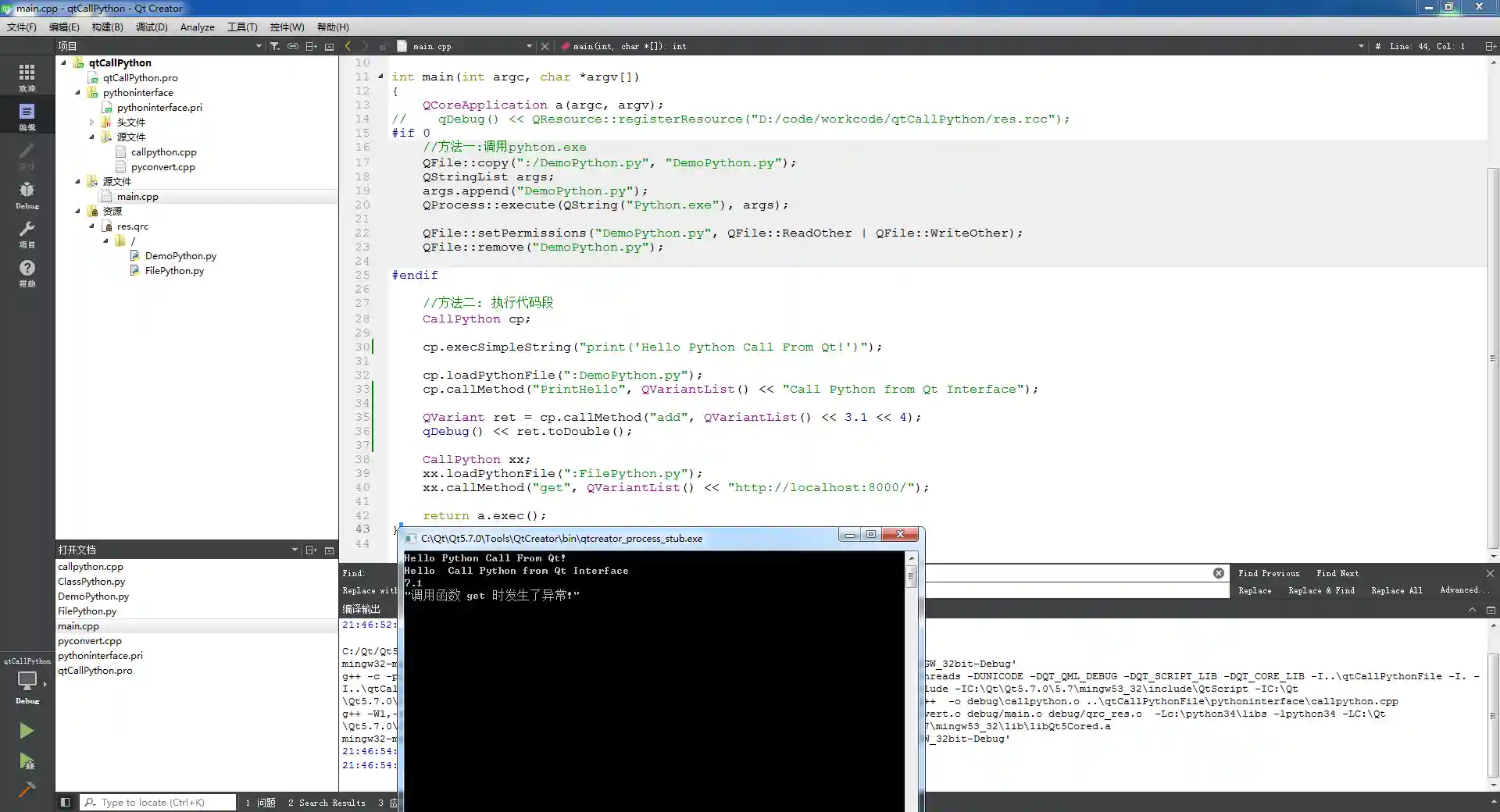1
2
3
4
5
6
7
8
9
10
11
12
13
14
15
16
17
18
19
20
21
22
23
24
25
26
27
28
29
30
31
32
33
34
35
36
37
38
39
40
41
42
43
44
45
46
47
48
49
50
51
52
53
54
55
56
57
58
59
60
61
62
63
64
65
66
67
68
69
70
71
72
73
74
75
76
77
78
79
80
81
82
83
84
85
86
87
88
89
90
91
92
93
94
95
96
97
98
99
100
101
102
103
104
105
106
107
108
109
110
111
112
113
114
115
116
117
118
119
120
121
122
123
124
125
126
127
128
129
130
131
132
133
134
135
136
137
138
139
140
141
142
143
144
145
146
147
148
149
150
151
152
153
154
155
156
157
158
159
160
161
162
163
164
165
166
167
168
169
170
171
172
173
174
175
176
177
178
179
180
181
182
183
184
185
186
187
188
189
190
191
192
193
194
195
196
197
198
199
200
201
202
203
204
205
206
207
208
209
|
#include "callpython.h"
#include <QFile>
#include <QDebug>
CallPython::CallPython():
m_bInitOk(false)
{
m_object = NULL;
Py_Initialize();
m_bInitOk = Py_IsInitialized();
}
CallPython::~CallPython()
{
Py_Finalize();
}
PyObject *CallPython::getMainModule()
{
PyObject *dict = PyImport_GetModuleDict();
return PyDict_GetItemString(dict, "__main__");
}
PyObject *CallPython::lookupObject(PyObject* module, const QString& name)
{
QStringList l = name.split('.');
PyObject* p = module;
QByteArray b;
for (QStringList::ConstIterator i = l.begin(); i!=l.end() && p; ++i) {
b = QStringToPythonEncoding(*i);
if (PyDict_Check(p)) {
p = PyDict_GetItemString(p, b.data());
}
else {
p = PyObject_GetAttrString(p, b.data());
}
}
PyErr_Clear();
return p;
}
PyObject* CallPython::lookupCallable(PyObject* module, const QString& name)
{
PyObject* p = lookupObject(module, name);
if (p) {
if (PyCallable_Check(p)) {
return p;
}
}
PyErr_Clear();
return NULL;
}
int CallPython::execSimpleString(QString ps)
{
return PyRun_SimpleString(ps.toUtf8().constData());
}
QVariant CallPython::callMethod(const char *method, const QVariantList& args)
{
if(!m_object){
qDebug() << "请先加载文件";
return -1;
}
PyObject* methodobj = PyObject_GetAttrString(m_object, method);
if(methodobj){
PyObject* r = callAndReturnPyObject(methodobj, args);
if(r){
return PyConvert::PyObjToQVariant(r);
}
else{
qDebug() << QString("调用函数 %1 时发生了异常!").arg(method);
}
}
else{
qDebug() << QString("没有找到函数: %1 ").arg(method);
}
PyErr_Clear();
return QVariant();
}
PyObject* CallPython::callAndReturnPyObject(PyObject* callable, const QVariantList& args)
{
PyObject* result = NULL;
if (callable) {
bool err = false;
PyObject* pargs;
int count = args.size();
if (count > 0 ) {
pargs = PyTuple_New(count);
for (int i = 0; i < count; i++) {
PyObject* arg = PyConvert::QVariantToPyObject(args.at(i));
if (arg) {
PyTuple_SetItem(pargs, i,arg);
}
else {
err = true;
break;
}
}
}
if (!err) {
PyErr_Clear();
result = PyObject_CallObject(callable, pargs);
}
}
return result;
}
int CallPython::loadPythonFile(QString fileName)
{
QFile file(fileName);
if(file.open(QIODevice::ReadOnly)){
QByteArray data = file.readAll();
if (m_object){
Py_DECREF(m_object);
}
m_object = getMainModule();
PyObject *code = compileSource(fileName, data);
if (code) {
evalCode(m_object, code);
}
}
return 0;
}
QVariant CallPython::evalCode(PyObject* object, PyObject* pycode)
{
QVariant result;
if (pycode) {
PyObject* dict = NULL;
PyObject* globals = NULL;
if (PyModule_Check(object)) {
dict = PyModule_GetDict(object);
globals = dict;
} else if (PyDict_Check(object)) {
dict = object;
globals = dict;
}
else{
dict = PyObject_GetAttrString(object, "__dict__");
globals = PyObject_GetAttrString(PyImport_ImportModule(PyString_AS_STRING(PyObject_GetAttrString(object, "__module__"))),"__dict__");
}
PyObject* r = NULL;
if (dict) {
#ifdef PY3K
r = PyEval_EvalCode(pycode, globals, dict);
#else
r = PyEval_EvalCode((PyCodeObject*)pycode, globals, dict);
#endif
}
if (r) {
Py_DECREF(r);
}
else {
handleError();
}
}
else {
handleError();
}
return result;
}
void CallPython::handleError()
{
PyErr_Print();
}
PyObject *CallPython::compileSource(const QString& path, const QByteArray& data)
{
PyObject *code;
#ifdef PY3K
PyObject* filename = PyConvert::QStringToPyObject(path);
code = Py_CompileStringObject(data.data(), filename,
Py_file_input, NULL, -1);
Py_DECREF(filename);
#else
code = Py_CompileString(data.data(), QStringToPythonConstCharPointer(path),
Py_file_input);
#endif
return code;
}
|

 支付宝打赏
支付宝打赏
 微信打赏
微信打赏
 支付宝打赏
支付宝打赏
 微信打赏
微信打赏
Related Issues not found
Please contact @spygg to initialize the comment